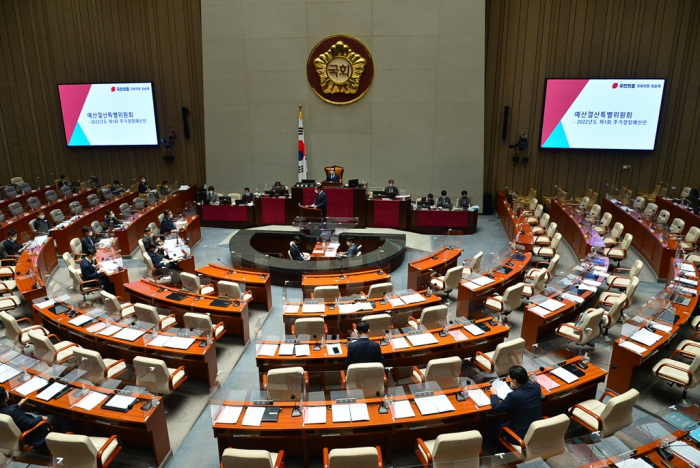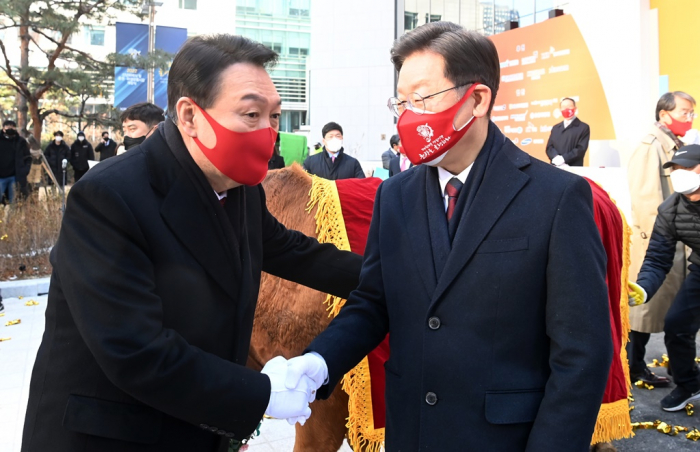Treasury bonds
Korea bond yields near four-year highs on extra budget
Government may need to triple deficit bond issuance as lawmakers seek to raise extra budget ahead of presidential election
By Feb 09, 2022 (Gmt+09:00)
3
Min read
Most Read
Macquarie Korea Asset Management confirms two nominees


Deutsche Bank's Korea IB head quits after country head resigns


Hanwha buys SŌĆÖpore Dyna-MacŌĆÖs stake for $73.8 mn from Keppel


Korea's Taeyoung to sell local hotel to speed up debt workout


VC firm DSC Investment forms Korea's largest secondary fund



South KoreaŌĆÖs government bond yields jumped to their highs in almost four years as lawmakers sought to raise a supplementary budget to up to $42 billion ahead of the presidential election next month, fanning expectations of increasing deficit bond issuance.
The most liquid three-year Korean treasury bond yield on Tuesday rose 6.6 basis points (bps) to 2.303%, the highest since May 15, 2018. The yield gained 50.5 bps this year. The 10-year government bond yield also advanced 9.5 bps to 2.733%, the largest since June 7, 2018.
The countryŌĆÖs treasury bonds are usually in great demand in January and February as insurers and asset managers aggressively buy them with new yearŌĆÖs budgets. But the market failed to attract much demand this year with investor sentiment soured as the ruling and opposition parties tried to expand an extra budget ahead of the presidential election on March 9. That stoked expectations that the government will have to issue more deficit bonds, which will lift borrowing costs and hurt private consumption and investment, eventually.
Foreign investors already dumped a combined net 20,825 contracts of the three-year treasury bond futures in the first eight days of this month, more than a total net sale of 18,015 contracts in January, according to the Korea Exchange.
LAWMAKERS WANT MORE
The government in January proposed a supplementary budget of 14 trillion won ($11.7 billion) to support small companies and the self-employed, about a month┬Āafter lawmakers approved a record 607.7 trillion won spending for this year. But the Trade, Industry, Energy, SMEs and Startup Committee of the parliament on Monday agreed to raise the extra spending to 39 trillion won, sending the decision to the Special Committee on Budget & Account for review.
The ruling Democratic Party has been urging to increase the budget to some 35 trillion won for more financial support to smaller firms, while the main opposition People Power Party has been seeking 50 trillion won.

President Moon Jae-in partially agreed to the increase demanded by lawmakers, saying the government will review ŌĆ£reasonable alternativesŌĆØ proposed by the parliament.
The government is expected to issue deficit bonds to fund most of the extra spending. The finance ministry already planned to sell 11.3 trillion won in deficit bonds for the 14 trillion won supplementary budget, while both parties suggested about 30 trillion won worth of such bond issuance.
ŌĆ£Interest rates continued to rise, given the uncertainties over the size of deficit bonds,ŌĆØ said KB Securities analyst Kim Sang-hoon. ŌĆ£Concerns also grew over another supplementary budget after the presidential election.ŌĆØ
SIDE EFFECTS
The benchmark three-year Korean treasury bond yield could shoot to 3% if the central bank raises interest rates to 2% and the government carries out more pork-barrel policies, some market participants said.
The Bank of Korea is expected to ramp up its policy interest rates further later this year after raising the base rate to a pre-pandemic level of 1.25% last month to curb inflationary pressure. The US Federal Reserve also is predicted to jack up borrowing costs in March.
Accommodative fiscal policies of the Democratic Party and People Power Party pushed up market interest rates, casting concerns over a potential slowdown in the private sectorŌĆÖs consumption and investment.
An extra budget is also feared to put further upward pressure on prices, which are already expected to rise this year at the fastest pace in 11 years.
ŌĆ£A significant fiscal expansion may add to inflationary pressure,ŌĆØ said a member of the BOKŌĆÖs monetary policy board, according to minutes from the central bankŌĆÖs January meeting.
Write to Ik-Hwan Kim, Do-Won Lim and So-Hyeon Kim at lovepen@hankyung.com
Jongwoo Cheon edited this article.
More to Read
-

-
 Central bankingBOK restores interest rates to pre-pandemic level
Central bankingBOK restores interest rates to pre-pandemic levelJan 14, 2022 (Gmt+09:00)
3 Min read -

-

Comment 0
LOG IN


